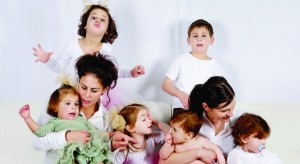Dappling in Cleaning Formulas: Tamar Rosenthal & Dana Rubinstein
Why am I using fluorescent green products to clean my baby’s bottle? Dana Rubinstein, a mother and attorney, asked herself this question five years ago. Aware that her friend Tamar Rosenthal had a three-year-old daughter who was allergic to conventional cleaning products, Rubinstein called her friend and inquired about safer alternative cleaning products for baby bottles.
Shortly thereafter, Dapple Baby was born. At the time, Rosenthal, now thirty-four, was in school for nonprofit management. She and Rubinstein, now thirty-five, fell upon “a white space that needed to be filled.”
“We got involved in something that we never imagined we would do,” explains Rosenthal.
The women decided to create new cleaning products that are safe for babies.
In 2008, the two women got to work creating formulas from scratch, and consulted with pediatricians and chemists. They stored the equipment in their apartments, and drove around to various retailers marketing their product. Targeting parents of children between the ages of newborn to three, Dapple products use natural-based ingredients that are environmentally safe and free of synthetic dyes or fragrances. Dapple products include a hypoallergenic baby-safe bathtub cleaner and a natural bottle cleaner. The women learned certain skills on the job, such as how to work with manufacturers, decipher chemical formulas and guide chemists to create products that met their satisfaction. Rosenthal states that “breaking into the retail world” proved to be the biggest challenge. At first, some retailers were not persuaded to carry Dapple Baby. But within six months of launching into retail, they scored a meeting at Babies “R” Us, and a short time later, at Buy Buy Baby.

Dana Rubinstein (right) and Tamar Rosenthal launched Dapple Baby, now available nationwide in stores including Babies “R” Us and Buy Buy Baby.
Photo courtesy of Dapple Baby
The timing was right. Parents were becoming more conscious of the environmental impact of chemicals, leading a healthier lifestyle and making healthier choices. “We got really lucky,” comments Rubinstein. “Parents had started looking for the type of products that we create and market.” Today, Dapple Baby is available nationwide, and its products can be purchased from the Dapple site (dapplebaby.com) or at a number of major retailers like diapers.com, Walgreens and Duane Reade. The Dapple mothers learned, “not to take no for an answer,” says Rosenthal. “Persistence is key.”
“Everything is easier if you have the right business partner to share it with,” says Rosenthal. As Orthodox Jews, the two possess a deep understanding of each other’s priorities—particularly when it comes to family. Rubinstein and Rosenthal both feel that they have found the right match. “We share our ups and downs, excitements and encourage each other,” explains Rubinstein. “We also jump in for each other when the other has outside commitments.”
The Dapple mothers learned, “not to take no for an answer,” says Rosenthal. “Persistence is key.”
Rosenthal describes running a business as a “constant rollercoaster with a lot of unknowns.” As a “perfectionist,” she finds it challenging to achieve a balance between work and family. The Dapple mothers have an intense work schedule, both of them commuting from the Upper West Side in Manhattan to their office on Long Island at 9 AM, and leave at 4:30 PM to pick their children up from school. In the evenings, after the kids have gone to bed, the women usually continue working. On Fridays, they work from home. “Aside from Shabbos, we are always on,” explains Rosenthal. “It helps being one’s own boss. If we need to take time for important family events or one of our kids’ events in school, we can almost always adjust our schedules to accommodate.” They each have four children. Rubinstein’s children range between the ages of two and eight and Rosenthal’s range between two and ten.
Rosenthal finds it helps to stay organized and, when necessary, asks for help from friends, neighbors and her mother. On Sunday evenings, Rosenthal plans for the week ahead, preparing menus for the upcoming week and ordering all necessary ingredients either online or over the phone. She creates a master schedule for all her kids’ playdates and coordinates her meeting and travel schedules.
Rubinstein struggles with feelings of guilt on a daily basis both at home and work. While she constantly works at it, Rubinstein feels that she is “never over it.” A family-friendly work environment makes a difference. She keeps a supply of kid-friendly activities in her office so that when her kids have off from school, they can come to work with her and not be bored.
Both women strive to be wonderful partners to their husbands and great role models to their children. “It’s nice for kids to see their moms do something they’re excited about, and love what they do,” says Rubinstein.
Avigayil Perry lives in Norfolk, Virginia, with her family and writes for various Jewish publications.
More In This Section
A Business of Her Own
Growing numbers of Orthodox women from across the spectrum of Orthodoxy are using their ambition, ingenuity and creativity to launch successful businesses of their own.
Building a Community of Women: Chaya Fishman by Avigayil Perry
Making Your Dream House Come True: Chaya Ruchi Gross by Avigayil Perry
Growing a Tree of Knowledge: Nechama Salfer by Avigayil Perry
The New Entreprenuer by Bayla Sheva Brenner
